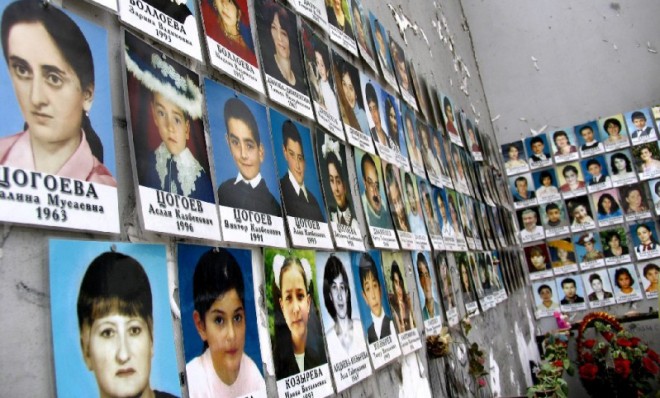The Boston Marathon bombings and Chechnya's long history of terrorism
The prime suspects reportedly hail from the restive region, where insurgents have fought a long-running war against the Russian state


A free daily email with the biggest news stories of the day – and the best features from TheWeek.com
You are now subscribed
Your newsletter sign-up was successful
After a dramatic night that saw law enforcement officials engage in a running battle with two terrorism suspects in the suburbs of Boston, reports emerged this morning that the suspects — identified as brothers Dzhokdar Tsarnaev and Tarmerlan Tsarnaev — originally hailed from Chechnya, a restive region in southern Russia that has a long history of using terrorist tactics in its war against the Russian state.
Of course, we still know very little of the Tsarnaev brothers' personal histories, motivations, or potential ties to terror groups. But we do know a lot about the part of the world they come from.
Chechnya is a predominantly Muslim region in the North Caucasus where insurgents have been fighting for an independent state ever since the collapse of the Soviet Union in 1991. In 1994, a full-scale insurgency broke out, leading to two years of heavy conflict in which tens of thousands of Chechens and several thousand Russian soldiers died.
The Week
Escape your echo chamber. Get the facts behind the news, plus analysis from multiple perspectives.

Sign up for The Week's Free Newsletters
From our morning news briefing to a weekly Good News Newsletter, get the best of The Week delivered directly to your inbox.
From our morning news briefing to a weekly Good News Newsletter, get the best of The Week delivered directly to your inbox.
In 1999, President Vladimir Putin ramped up Russia's military presence in Chechnya, sparking another war that killed 5,000 Russian troops and as many as 50,000 Chechen civilians. The region is now firmly in Russia's grip, and is led by a strongman, Ramzan Kadyrov, who has close ties to Moscow.
However, Chechen insurgents have sporadically conducted spectacular terrorist attacks in Russia.
* In 2002, Chechen militants took control of a theater in Moscow, holding the patrons hostage. An ensuing, controversial raid by Russian police ended the standoff, but not before 129 hostages were killed.
* In 2004, insurgents seized a school in Beslan, in the North Caucusus, and 330 hostages, many of them children, were killed before the siege ended. The raid was orchestrated by rebel leader Shamil Basayev, who was reportedly killed by Russian forces in 2006. (Read C.J. Chivers' extraordinarily powerful story on the siege here.)
A free daily email with the biggest news stories of the day – and the best features from TheWeek.com
* Also in 2004, more than 40 commuters were killed when bombs were detonated in the Moscow subway system, an attack blamed on Chechen rebels. Later that year, Chechens were blamed for taking down two Russian airplanes with suicide bombers.
* In 2010, suicide bombings in the Moscow subway system killed at least 40 people. A Chechen rebel group, led by Dokka Umarov, claimed responsibility for the blasts.
* In 2011, an Islamic extremist from Ingushetia, another rebellious region in the North Caucasus, was blamed for a suicide bombing at the Moscow airport that killed 37.
The Boston Marathon bombing is the first time that Chechen extremists have been linked to a terrorist attack in the U.S. Chechen insurgents are thought to have had a largely domestic focus in the past, though Chechen fighters have had links to al Qaeda and have showed up in the tribal areas of Pakistan and Afghanistan, both safe havens for Islamic terrorist groups.
Here is the Council on Foreign Relations on the relationship between Chechen groups and international terrorism:
Experts say there are several ties between the al Qaeda network and Chechen groups. A Chechen warlord known as Khattab is said to have met with Osama bin Laden while both men were fighting the 1979-89 Soviet occupation of Afghanistan. Alexander Vershbow, a U.S. ambassador to Russia, said shortly after September 11, 2001, "We have long recognized that Osama bin Laden and other international networks have been fueling the flames in Chechnya, including the involvement of foreign commanders like Khattab." Khattab was killed in April 2002.
Zacarias Moussaoui, who was convicted for his involvement in the September 11 attacks, was reported by the Wall Street Journal to be formerly "a recruiter for al Qaeda-backed rebels in Chechnya." Chechen militants reportedly fought alongside al Qaeda and Taliban forces against the U.S.-backed Northern Alliance in late 2001. The Taliban regime in Afghanistan was one of the only governments to recognize Chechen independence.
Russian authorities, including Prime Minister Vladimir Putin, have repeatedly stressed the involvement of international terrorists and bin Laden associates in Chechnya — in part, experts say, to generate Western sympathy for Russia's military campaign against the Chechen rebels. Russia's former defense minister, Sergei Ivanov, claimed that a videotape of Khattab meeting with bin Laden had been found in Afghanistan, but Russia has not aired the tape publicly. [Council on Foreign Relations]
Ryu Spaeth is deputy editor at TheWeek.com. Follow him on Twitter.
-
 Regent Hong Kong: a tranquil haven with a prime waterfront spot
Regent Hong Kong: a tranquil haven with a prime waterfront spotThe Week Recommends The trendy hotel recently underwent an extensive two-year revamp
-
 The problem with diagnosing profound autism
The problem with diagnosing profound autismThe Explainer Experts are reconsidering the idea of autism as a spectrum, which could impact diagnoses and policy making for the condition
-
 What to know before filing your own taxes for the first time
What to know before filing your own taxes for the first timethe explainer Tackle this financial milestone with confidence